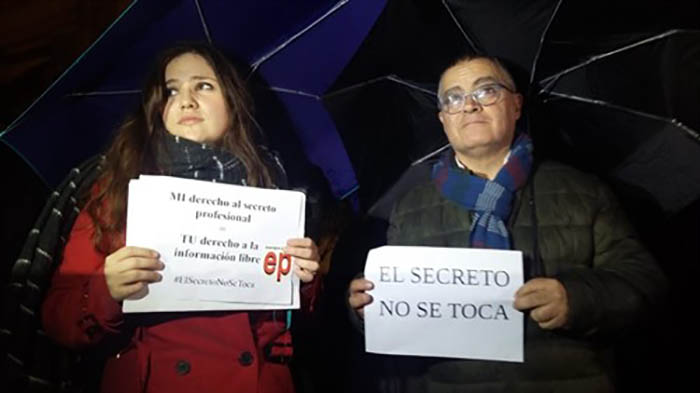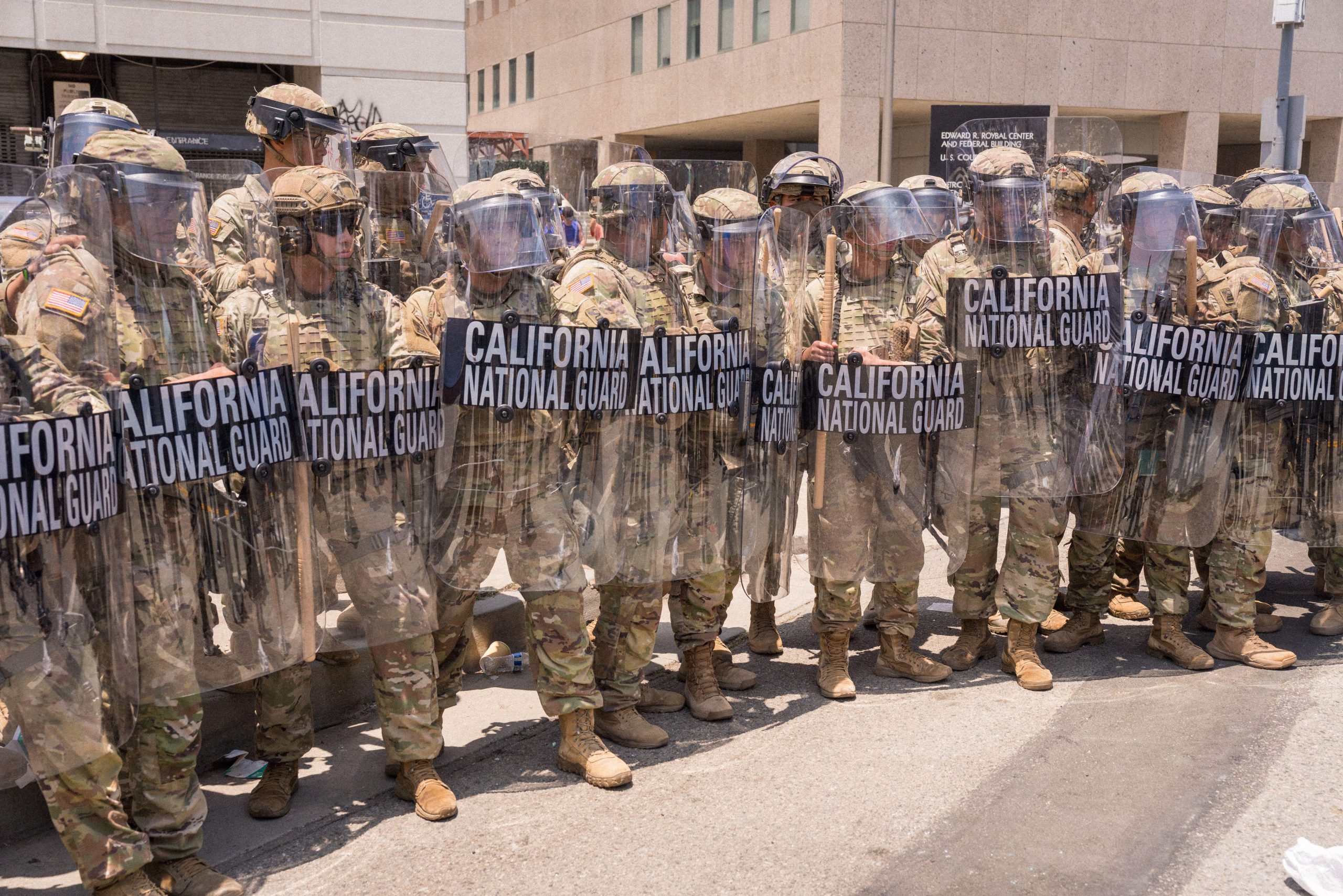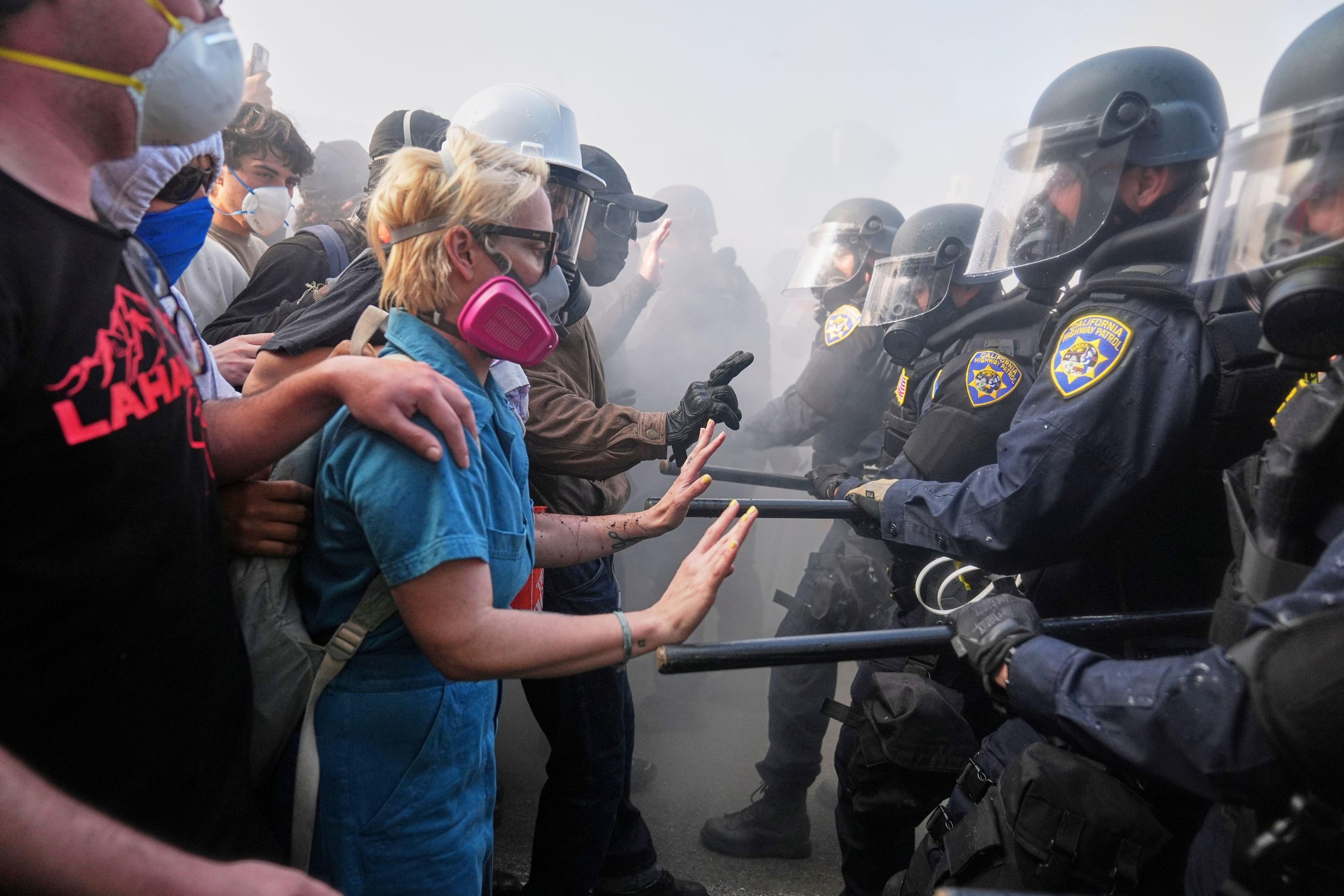[vc_row][vc_column][vc_column_text]

Blanca Pou and Kiko Mestre showing solidarity with journalists in court in December 2018
In March 2017 prominent Mallorca businessman Bartolomé Cursach was arrested on charges including bribery, extortion, making threats, money-laundering, homicide, corruption of minors and possession of firearms.
In July 2018 Palma-based news agency Europa Press Mallorca published details of a secret police report that formed part of the investigation into Cursach’s business affairs. On 11 December, following orders by judge Miguel Florit, National Police officers investigating the leak of the police report seized documents, mobile phones and computers belonging to editors Kiko Mestre of the regional daily Diario de Mallorca, and Blanca Pou of Europa Press.
The action was considered an attack on freedom of the press for not respecting the right of journalists to protect the identity of their sources. Professional secrecy for journalists is recognised by the Spanish Constitution in Article 20.
“Judge Florit seems to have forgotten that journalists have not only the right, but the duty to protect our sources,” said Kiko Mestre. “Otherwise, investigative reporting would not exist.”
The seizure of the journalists’ equipment has given rise to protests among journalists at the regional, national and international levels. As Mestre tells Index on Censorship: “Journalism professionals have come together as never before. This is a one-of-a-kind case in Spain and does not only affects Blanca and me but the essence of journalism.”
On 14 December almost 200 journalists from Mallorca gathered in Palma city in defence of the citizens’ right to information. During the protest, representatives of the Union of Journalists of the Balearic Islands (SPIB) and the Association of Journalists of the Balearic Islands (APIB) read a joint statement describing the judicial action as a “direct attack on the free exercise of journalism”. APIB also published a manifesto on its website, which has been signed by more than 1700 journalists. Ángeles Durán, president of APIB, stressed the importance of journalists defending their rights: ”Journalists must demand compliance with the Constitution and fight for free information, which involves criticism of restrictive laws. All coercive measures towards journalists undermine the right to information.”
Demonstrations were also called in Madrid and Barcelona at the entrance to the Supreme Court and the High Court of Justice under the slogan: “Our professional secrecy, your right to information.”
The Spanish journalists’ federation FAPE, the Platform for the Defence of Freedom of Information PDLI and the Association of Media AMI also condemned the judicial and police action and defended the right to professional secrecy through public statements.
Cursach’s influence on Mallorcan institutions and public powers became apparent at the beginning of the investigation. As Mestre said, Cursach has “always shown interest in controlling the media”. Indeed, it is not the first time Mestre feels under pressure. “I have been the target of a smear campaign with very serious comments on social media. A lawyer hired by Cursach coerced me and published serious accusations on a social media page whose followers are all either charged in the judicial case or employed by Cursach.”
“There are very obscure interests behind,” added Durán. “The situation seems to be the plot of a film with corruption at all levels.”
“The first days after the seizure I feared I could be followed,” admits Pou. “Any judicial process makes you nervous, but if you are not sure it will be a clean process, then you feel more insecure.”
This is not an isolated case of an attack on freedom of the press in Spain. In the last world ranking on press freedom by Reporters Without Borders in April 2018, Spain went down two places, from 29th to 31st, from the year previous. Spain’s profile on Mapping Media Freedom also shows an increase in media freedom violations year-on-year.
Durán said: “We all know of cases at the national level that are quite surprising for a democracy, such as the seizure of the book Fariña. And the Gag Law is a tool of coercion and censorship. In 2015 then minister of Justice Rafael Catalá suggested penalising media that published judicial leaks. Politicians try to silence the press, and now judicial powers are putting freedom of information at risk. We have always been aware of indirect pressures from political powers through subsidies and institutional advertising, but the role that some judges are adopting is alarming.”
Mestre claims their work is being hindered: “There is more and more interference of the judicial power and we are being criminalised. Florit has gone beyond limits that had never been overstepped in the history of Spanish democracy. Instead of prosecuting the perpetrators of the crimes, it is our work what has been questioned.”
As for Pou, journalists’ honesty is being completely sidelined: “No matter how honest the journalist is, sources are unprotected and can be identified.”
Both journalists filed a complaint against judge Florit for perversion of justice, offence against inviolability of the home and against the right to professional secrecy. The significance of the incident is not limited to press freedom in today’s Spain, but in the future. As Pou said: “We want a clear sentence saying this is perversion of justice and cannot be done. Otherwise, other judges may act likewise in the future. The truth ought to be public, no matter what way the judicial path ends.”[/vc_column_text][/vc_column][/vc_row][vc_row][vc_column][vc_basic_grid post_type=”post” max_items=”4″ element_width=”6″ grid_id=”vc_gid:1552064184491-2132ed12-1306-9″ taxonomies=”7389, 199″][/vc_column][/vc_row]




